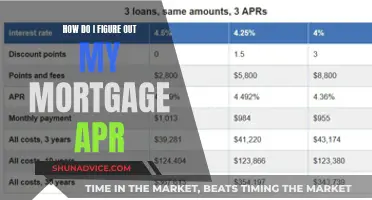
If you're interested in becoming an independent mortgage advisor, there are a few key steps you need to take. Firstly, you'll need a strong understanding of the role and its responsibilities. This includes facilitating mortgage agreements between lenders and borrowers, establishing relationships with lenders, guiding clients through the loan process, and staying up to date with the real estate and lending markets. Most states require a mortgage license, and you'll need to decide whether to work from a physical office or remotely. You'll also need to consider your work experience, as lenders prefer candidates with a background in real estate or banking. With the right combination of knowledge, skills, and strategy, you can build a successful and rewarding career as an independent mortgage advisor.
| Characteristics | Values |
|---|---|
| Education | A high school diploma or GED is required. A college degree is not necessary, but an associate or bachelor's degree in business administration, finance, or accounting may improve career opportunities and potential salaries. |
| Licensing | A mortgage broker license is required in most states and areas. This requires completing a pre-licensure program and passing the NMLS exam (SAFE Mortgage Loan Originator Test). The license must be renewed annually. |
| Role | Independent mortgage brokers are not employed by any specific firm and can offer clients the best deals from various lending sources. They advise clients on selecting the best loans, process loan applications, and facilitate agreements between lenders and borrowers. |
| Salary | The average salary for a mortgage broker in the United States is $170,342, but this can vary depending on experience, location, and employment type. Independent brokers may have less consistent income but benefit from higher commissions and flexible work environments. |
| Skills | Strong entrepreneurial and financial skills are essential. Understanding lending rates, terms, institutions, credit reporting, and eligibility criteria is crucial. Communication skills and the ability to build professional relationships are also important. |
| Experience | Experience in the real estate or banking industry is beneficial, as it helps with understanding financial documents, using loan-underwriting software, and analyzing real estate market trends. |
What You'll Learn

Understanding the role and responsibilities
Role
Mortgage advisors, also known as mortgage brokers, are specialists in mortgage products and services. Their primary role is to help clients navigate the often complex world of mortgages and find the best deal for their unique circumstances. This involves getting to know the client and their financial situation, offering advice, and guiding them through the application process.
Responsibilities
The responsibilities of a mortgage advisor include building relationships with clients, understanding their needs, and providing impartial advice on the most suitable mortgage products. They may also handle the application process, including filling out paperwork, and can offer access to exclusive deals that aren't available directly from lenders.
Mortgage advisors must also stay up to date with the latest mortgage products and services, as well as any changes or developments in the market. This ensures they can provide their clients with the most accurate and beneficial advice.
Independence
An independent mortgage advisor, also known as a 'whole of market' advisor, has no ties to any specific mortgage lender. This means they can offer a wider range of options and completely impartial advice. They are not limited to a single lender or group of lenders like a 'tied' or 'multi-tied' broker.
Independent advisors may work for themselves or within a brokerage, and they typically charge clients by the hour or receive a commission on top of their basic salary or fees.
Qualifications
To become an independent mortgage advisor in the UK, you must obtain the necessary qualifications. The most widely recognised certification is the Certificate in Mortgage Advice and Practice (CeMAP), which is endorsed by the Financial Conduct Authority (FCA). You can study this independently or with employer support, and it usually takes between six months and two years to complete.
Alternatively, you can pursue the equivalent qualification, the Certificate in Mortgage Advice, offered by the Chartered Insurance Institute (CII).
Experience
While not mandatory, gaining experience in customer service, sales, or finance roles can be beneficial. Apprenticeships and training schemes are also available to provide practical experience and help you get started in your career as a mortgage advisor.
Adding Your Daughter to Your Mortgage: What You Need to Know
You may want to see also

Getting qualified and licensed
To become an independent mortgage advisor in the UK, you must get certified. The most common qualification is the Certificate in Mortgage Advice and Practice, or CeMAP. This qualification is endorsed by the Financial Conduct Authority (FCA) and is viewed as the industry standard. The CeMAP is a Level 3 course that usually takes between six months and two years to complete. It is made up of assessment modules and exams.
You can pursue the CeMAP independently or with your employer's support. Most course providers offer distance learning and other flexible study arrangements. There is no requirement to have a university degree or previous experience to become a mortgage advisor in the UK. However, certain fields of study and work experience can provide a solid foundation for your career. For example, you can gain experience in customer service and sales roles or finance, starting as a bank teller and working your way up within a financial institution.
The Chartered Insurance Institute (CII) offers an equivalent qualification to the CeMAP, the Certificate in Mortgage Advice, which is also approved by the FCA. Apprenticeships and training schemes can also provide a practical route to becoming a mortgage advisor, offering a combination of classroom instruction and real-world work experience.
As an independent mortgage advisor, you will likely charge your clients by the hour or receive a commission on top of your basic salary or fees. Independent advisors have no links to any specific mortgage lender, allowing them to offer impartial advice based on a wide range of mortgage options. Entry-level mortgage advisors in the UK can expect a salary between £20,000 and £25,000, while experienced advisors can earn over £70,000 per year, including commission.
QuickBooks Mortgage Management: Adding a Property Mortgage
You may want to see also

Registering your business
Licensing and Registration:
Firstly, you will need to obtain the necessary licenses and registrations specific to your state. Most states require mortgage brokers to have a mortgage license, but some do not. Check with your state's licensing authority to understand the requirements. You may also need to pass an exam, such as the NMLS (SAFE Mortgage Loan Originator Test), to obtain your license. Remember to renew your license annually and stay compliant with any ongoing education or credit check requirements.
Business Registration:
Register your business with your state's business registration office. This process may involve choosing a business structure (e.g., sole proprietorship, partnership, or limited liability company), selecting a business name, and providing information about your business location and activities.
Compliance and Regulations:
As a mortgage broker, you will need to comply with various regulations, such as federal and state mortgage laws, broker ethics, and financial regulations. Ensure you understand the specific rules that apply to your business, especially those related to processing loans, privacy, and financial services.
Insurance:
Obtaining appropriate insurance coverage is essential for your business. This may include professional liability insurance, errors and omissions insurance, and general business insurance to protect yourself and your business from potential risks and liabilities.
Industry Support:
Take advantage of organizations that support independent mortgage professionals, such as the Association of Independent Mortgage Experts (AIME). These organizations can provide valuable resources, networking opportunities, and guidance to help you establish and grow your business.
Physical Office or Remote Work:
Decide whether you want a physical office space or prefer to work remotely. Some states may require a physical office within their jurisdiction for you to be a legal mortgage broker in that state. Consider the benefits of each option, including flexibility, overhead costs, and client preferences.
Becoming a Mortgage Originator in Florida: A Guide
You may want to see also

Gaining experience
One way to gain experience is through apprenticeships and training schemes. These programs offer structured and practical experience, often combining classroom instruction with real-world work experience. You can find opportunities for apprenticeships and training schemes through resources like GOV.UK or the Institute for Apprenticeships.
Another way to gain experience is by starting in entry-level positions within the financial industry, such as customer service or sales roles. For example, you could start as a bank teller and gradually work your way up within a financial institution. This will allow you to develop your knowledge of financial products and services, as well as build your network and establish relationships with clients.
Networking and mentorships are also important aspects of gaining experience. Building a network of professionals in the industry can provide you with valuable connections, mentorship opportunities, and potential referrals. Mentorships can offer guidance, support, and insights into the day-to-day work of a mortgage advisor.
Additionally, gaining experience in a related field, such as finance, can be beneficial. This can include pursuing further education or certifications in finance or a specific field of study that will provide a solid foundation for your career as a mortgage advisor.
Remember that gaining experience is a gradual process, and it may take time to build up the knowledge and skills needed to become a successful independent mortgage advisor.
Becoming a Mortgage Officer: Texas Requirements and Steps
You may want to see also

Maintaining your license
Ongoing Education:
The mortgage industry is ever-evolving, and it is essential to stay updated with changes to remain competitive and relevant. NMLS-approved continuing education courses are required annually to ensure that you are up to date with industry developments. These courses will help you expand your knowledge and enhance your qualifications, allowing you to provide a broader range of services to your clients.
Annual License Renewal:
Your license will need to be renewed annually. This process may include passing background and credit checks, as well as meeting any additional state-specific requirements. Some states may have specific regulations regarding physical offices or residency requirements that you must adhere to. It is crucial to research and understand the renewal process and any applicable regulations in your state.
Compliance with Regulations:
As a mortgage broker, you must adhere to strict guidelines and regulations set by regulatory bodies such as the Financial Conduct Authority (FCA) in the UK or similar organizations in other countries. These guidelines are in place to protect consumers and prevent financial misconduct. Key areas of compliance include Anti-Money Laundering (AML), data protection and GDPR, and financial reporting, such as RegData Reporting.
Professional Indemnity Insurance:
Maintaining appropriate insurance coverage is essential to protect yourself and your business. Professional Indemnity Insurance (PII) is typically mandatory and helps safeguard against potential risks and liabilities. The cost of PII can vary depending on the size and risk profile of your firm.
Capital Requirements:
Regulatory bodies such as the FCA may require you to maintain a minimum amount of liquid capital to ensure your business's financial stability. For example, the FCA in the UK mandates that firms hold a minimum of £10,000 in liquid capital.
Compliance Support:
Consider engaging with firms that provide ongoing compliance support to ensure you remain up to date with changing regulations and industry standards. This support can help you navigate the complex world of compliance and ensure you meet all your legal obligations.
Becoming a Mortgage Advisor: Steps to Take
You may want to see also
Frequently asked questions
While most employers of mortgage brokers don't require candidates to have college degrees, candidates often earn an associate or bachelor's degree in business administration, finance or accounting. This may help improve their career opportunities and potential salaries. You will also need to complete a pre-licensure course and pass the NMLS exam, also known as the SAFE Mortgage Loan Originator Test.
An independent mortgage advisor is not employed by any specific mortgage brokering firm, allowing them to offer clients the best deal available from various lending sources. They are able to compare different lenders and products to find the best fit for their clients. They can also provide advice on the best loan structure and repayment options.
The median salary for a mortgage broker was $67,000 as of 2012. However, this amount may fluctuate for independent mortgage brokers. The average salary for a mortgage broker in the United States is $170,342, according to Indeed.com. This figure can vary depending on your level of experience, location, and employment type.







